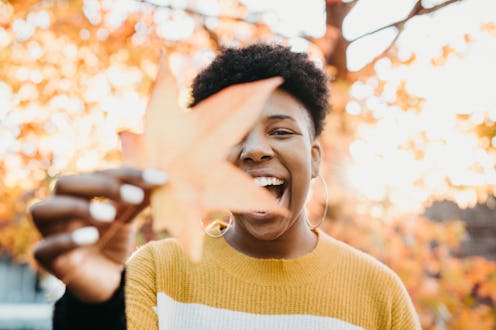Self
The Psychological Reason You’re So Obsessed With Fall
Time to trade your iced coffees for PSLs.

To the delight of those who couldn't wait for weather cool enough for cardigans and hot drinks, the siren call of fall first began to sound on July 24th: the day Taylor Swift's album Folklore dropped. This musical development belied the annual phenomenon of people getting psyched for pumpkin spice, apple pie, and sweater weather, even when temperatures are still in the 80s. The American perspective on fall is based on a dynamic concept of nostalgia and coziness — and psychologically, it has some interesting underpinnings that might explain why we're so obsessed with all things autumn.
According to Amy Jane Griffiths, Ph.D, N.C.S.P., a licensed psychologist and professor at Chapman University, people hype up cooler weather because those seasons are often associated with events and traditions that evoke memories of happier times. "We all crave the comfort and security that comes with traditions and predictability," Griffiths says. "They may relate to joyful experiences with friends and family and provide something to look forward to," she adds — things like fall holidays, back-to-school season, or seasonal treats. To combat the anxiety and sadness that the coronavirus pandemic has created, people are looking to the fall and winter as a way to anchor themselves to feelings associated with comfort, belonging, and safety.
Biologically, cooler temperatures provoke positive reactions. In 2012, researchers discovered that the cold made some people more likely to select films that they associated with "psychological warmth," like romantic comedies. When the temperature outside is lower, people reach for experiences that make them feel closer to others (think, cuffing season). If you associate the cooler (but not yet punishingly cold) fall season with snuggling inside with comfort food and heart-warming movies, this may be why.
But not everyone is a fall fanatic, which gives researchers some clues about broader attitudes towards autumn leaves and pumpkin spice. "In autumn, the subset of the individuals who become depressed in winter dread the fall holidays," Kathryn Roecklein, PhD, at the University of Pittsburgh's Department of Psychology tells Bustle. "Whenever they see things like leaves changing color, or Halloween candy in the stores, these signs of the seasons changing are an environmental cue that winter is coming," and seasonal affective disorder (SAD) with it. "People who are dreading the winter are not able to enjoy all these fall holidays and all the things that the broader population loves," she says.
After months of feeling disconnected from the calendar, people are looking for signs of change
Some people develop predispositions for certain seasons in childhood, which might explain why some people can't get enough of fall and others can't stand it. "There are people who have what we call seasonal beliefs, like 'I'm just not at my best in the winter'," Roecklein tells Bustle. "We've found that people who endorse these beliefs are more likely to be depressed in the winter."
To a lesser degree, it's possible that attitudes towards fall among people who don't experience SAD are also rooted in personal beliefs, like, "Fall means family time," "Pumpkin spice is the best," or "Autumn leaves are gorgeous." You may be activating positive memories of fall from your childhood; nostalgia is a powerful psychological tool. Peer pressure to enjoy autumn can also play a part. Humans evolved to mirror those around us to prevent social rejection, and when everyone on your Close Friends list is posting all-pumpkin everything, you'll likely feel pressure to express the same feelings — even if you hate the cold and think turkey is tasteless.
Griffiths says that people may just be looking forward to events to help mark time. After months of feeling disconnected from the calendar, people are looking for signs of change, and the shift from summer to fall and winter is dramatic and noticeable. And though Griffiths says that the countdowns and forward thinking trends can be a positive way to deal with stress in the moment, people should be careful about getting caught up in the idea that fall events will be a panacea for the stress and anxiety of the past six months. As for fall and winter 2020, "we will have to reimagine our traditions without expectations of it being the same."
If you or someone you know is seeking help for mental health concerns, visit the National Alliance on Mental Illness (NAMI) website, or call 1-800-950-NAMI(6264). For confidential treatment referrals, visit the Substance Abuse and Mental Health Services Administration (SAMHSA) website, or call the National Helpline at 1-800-662-HELP(4357). In an emergency, contact the National Suicide Prevention Lifeline at 1-800-273-TALK(8255) or call 911.
Experts:
Amy Jane Griffiths, Ph.D, N.C.S.P.
Kathryn Roecklein, Ph.D.
This article was originally published on